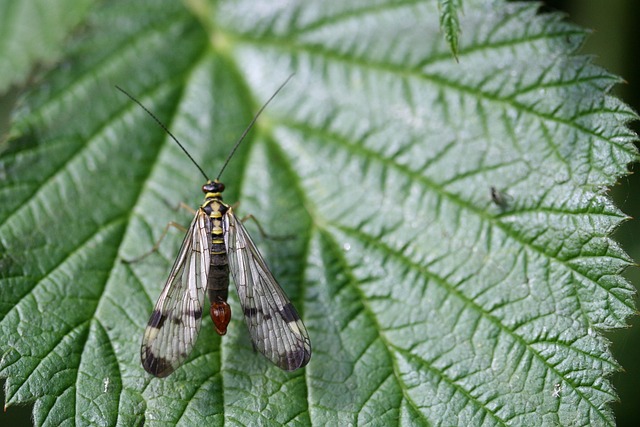Scorpions, nocturnal hunters drawn to warm, dry areas with hiding spots, often inhabit residential spaces unexpectedly. Effective residential scorpion control involves understanding their behavior and habitat preferences. Key strategies include maintaining a well-trimmed lawn, removing vegetation for camouflage, sealing entry points like cracks and gaps, and conducting regular outdoor lighting inspections. By addressing food sources and eliminating ideal microclimates, homes can become less appealing to scorpions. Professional residential scorpion control services offer advanced techniques like targeted treatments and identifying attractants, ensuring scorpions are eliminated and don't return.
Scorions can be a nuisance, but understanding their behavior is key to effective residential scorpion control. This guide offers professional advice on reducing attractants and preventing these arachnids from taking over your home. From identifying common attractants like moisture and dark spaces to implementing robust prevention measures, you’ll learn how to create an inhospitable environment for scorpions. Discover the best practices for long-term protection against residential scorpion control challenges.
Understanding Scorpion Behavior and Habitat in Residential Areas
Scorpions are elusive creatures that prefer dark, hidden spots, making their presence in residential areas both unexpected and unsettling. Understanding their behavior is the first step in effective scorpion control. These arachnids are primarily nocturnal, seeking shelter during the day and becoming active at night to hunt for food. They are attracted to warm, dry environments with plenty of cracks, crevices, and nooks to hide in, making residential homes an ideal habitat if proper precautions aren’t taken.
In residential areas, scorpions are often drawn to areas where water is scarce, as they require access to moisture to survive. Shrubs, grass, and other vegetation can provide the perfect camouflage for these predators, allowing them to blend into their surroundings undetected. To deter scorpions, it’s essential to maintain a well-trimmed lawn and landscape, removing any excessive debris or wood piles that could serve as potential hiding places. Regularly inspecting outdoor lighting fixtures and sealing any cracks or gaps in walls, foundations, or doors is also crucial for effective residential scorpion control.
Identifying Common Scorpion Attractants in Homes
Scorpions are drawn to homes for various reasons, often attracted by common attractants found in and around residential properties. Understanding these attractants is a crucial first step in implementing effective residential scorpion control strategies. One of the primary invitations for scorpions is food sources, including dead insects, spiders, and even small rodents or reptiles. These creatures provide essential protein for scorpions, making areas with abundant insect populations particularly appealing.
Additionally, scorpions are sensitive to heat and moisture gradients, often seeking out warm, moist environments to rest and breed. Cracks in foundations, poorly sealed doors and windows, and outdoor water sources like leaky faucets or birdbaths can create ideal microclimates that draw scorpions indoors. Identifying and addressing these attractants is key to making a home less welcoming to scorpions and improving overall residential scorpion control.
Implementing Effective Scorpion Prevention Measures
Implementing effective scorpion prevention measures is a crucial step in achieving successful residential scorpion control. Starting with identifying and eliminating potential attractants is key. Scorpions are drawn to areas that provide them with warmth, shelter, and food sources, such as piles of debris, overgrown vegetation, and water leaks. Regularly inspecting your home’s exterior for these elements and promptly addressing any issues can significantly deter scorpions.
Additionally, maintaining a clean and clutter-free environment inside your residence is essential. Scorpions can easily hide in dark, tight spaces, so eliminating potential hiding spots like cracks, crevices, and unused items reduces their presence. Using sealants to fill gaps in walls and floors further restricts their entry points. Together, these measures create an inhospitable environment, encouraging scorpions to seek shelter elsewhere, thereby enhancing your residential scorpion control efforts.
Professional Scorpion Control Services for Optimal Results
When dealing with a scorpion infestation, especially in a residential setting, it’s crucial to turn to professional scorpion control services. These experts have the knowledge and tools to effectively eliminate scorpions and prevent future infestations. Residential scorpion control involves a comprehensive approach tailored to your specific needs, ensuring optimal results.
Professionals utilize advanced techniques, such as targeted treatments, sealing entry points, and implementing preventive measures. They understand that identifying and removing attractants like moisture issues, proper waste disposal, and securing potential hiding places are key to successful long-term management. By hiring professionals, homeowners can benefit from specialized expertise, ensuring their homes become and remain scorpion-free environments.
By understanding scorpion behavior, identifying common attractants, and implementing effective prevention measures, homeowners can significantly reduce the presence of scorpions in their residential areas. For optimal results in professional scorpion control, consider hiring specialized services that offer tailored solutions. With the right approach, it’s possible to create an unwelcoming environment for these pests, ensuring a safer and more comfortable home. Remember, proactive measures and expert intervention are key to managing scorpion infestations effectively.
